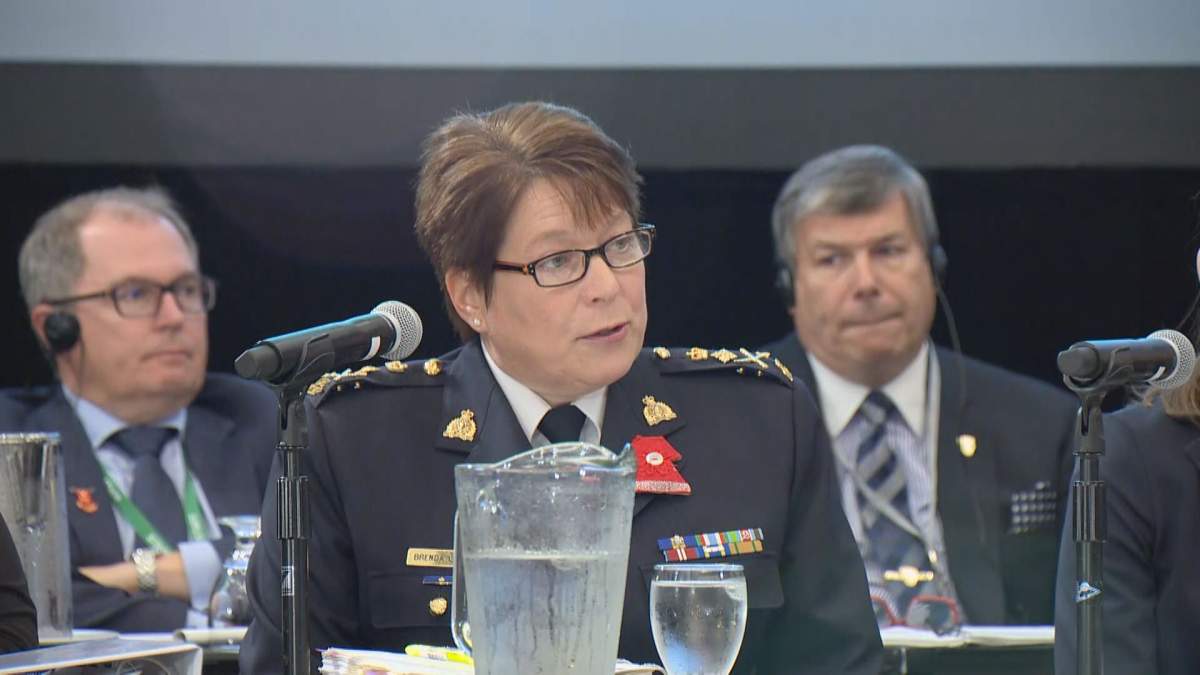The head of Canada’s national police force apologized to the families of missing and murdered Indigenous women Monday while pledging improved relations with Aboriginal communities.

“On behalf of myself and my organization, I’m truly sorry for the loss of your loved ones and the pain that this has caused you and your families and your communities,” RCMP Commissioner Brenda Lucki testified in Regina at the national inquiry into missing and murdered Indigenous women.
READ MORE: MMIW commissioners slam decision to grant shortened extension
“I’m sorry that for too many of you, the RCMP was not the police service that it needed to be during this terrible time in your life. It is very clear to me that the RCMP could have done better and I promise to you we will do better.”
The inquiry has been holding hearings from more than a year and time and again stories have surfaced of police not taking the cases of missing Indigenous women seriously. Victims were frequently seen to be written off by investigators as sex trade workers or addicts.
READ MORE: Women working in Vancouver sex trade were seen as ‘disposable,’ inquiry hears

Get daily National news
Lucki said the RCMP has made changes to its cadet training curriculum to include more Indigenous material.
One of the added modules includes a scenario involving an 18-year-old Indigenous girl whose back story is constructed from testimony heard at the inquiry.
Lucki said that she wants the cadets to get exposure to those situations.
“Given some of the things that have come out of the testimonies, it’s important that they have recognition of the cultural sensitiveness of these investigations and the importance of knowing what to expect with these investigations,” Lucki said.
Another addition to RCMP training includes a blanket exercise in which cadets are taught to better understand the different issues facing Indigenous people. That program has been introduced over the last four to six months and Lucki participated in the first one.
Heather Bear, vice-chief with the Federation of Sovereign Indigenous Nations, said there must be oversight to see if this new training changes attitudes.
She said that it’s going to take time to notice a difference, noting she still gets calls from Indigenous women who have experience police violence.
“By having this training, the awareness, for our people, the measuring is going to be when the harassment stops. Then we’ll know it has succeeded,” Bear said. “Today, these are words and these are attempts so I guess the test of time is what I’ll be watching.”
READ MORE: Saskatoon MMIW support group critical of inquiry extension
Marion Buller, the inquiry’s chief commissioner, said she thought Lucki’s apology was heartfelt and sincere.
I think it’s certainly a good beginning,“ Buller said. ”The proof will be in what happens on the ground.“
Lucki became the RCMP’s new commissioner in April and is the first commissioner from the Mounties to be a witness at the inquiry.
She said that an Aboriginal and First Nations awareness course is mandatory for cadets to take within two years. It’s also mandatory training for officers in some northern parts of the country.







Comments